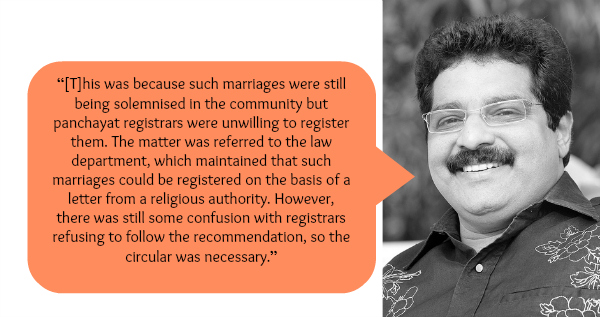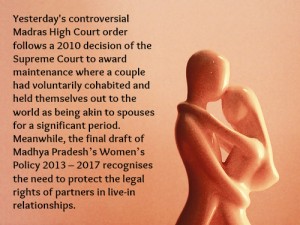A seven-member committee of the Law Commission of India led by its Chairman (retired) Justice A.P. Shah, has recommended an amendment to the Hindu Adoption and Maintenance Act, 1956 (“Act”). This amendment would direct the family of a man to protect and maintain his Hindu wife if he cannot do so himself due to physical, mental, or any other kind of disability.
The matter was referred to the Law Commission by the Punjab and Haryana High Court after the case of Avtar Singh v. Jasbir Singh, RSA No. 29/1988. In that case, the wife of a man of unsound mind had sought, as maintenance, a one-fourth share in the land belonging to the family. Initially she was given the share through a settlement effected by the village Panchayat but was later driven out of the land by her father-in-law.
In passing his judgment, Justice Paramjeet Singh noted “In such a situation, the wife should be deemed to be dependent upon the father-in-law and entitled to maintenance as provided under Section 19 of the Hindu Adoptions and Maintenance Act.”
The panel has recommended the following insertion in Sub-section 4 of Section 18 of the Act, as: “Where the husband is unable to provide for his wife, on account of physical disability, mental disorder, disappearance, renunciation of the world by entering any religious order or other similar reasons, the Hindu wife is entitled to claim maintenance during her lifetime, from members of the joint Hindu family of the husband, except where the husband has received his share in the joint family property.”
Even before Avtar Singh, the issue had been in focus before the Bombay High Court in Ramabai v. Trimbak Ganesh Desai in which it held, “No doubt, the authorities do not show that the relations of a deserted wife are under a personal liability to maintain her; but they do show that she is entitled to be maintained out of her husband’s property to the extent of one -third of the proceeds of that property.”
In Gopala Pattar v. Parvathi Ammal (1929), the Madras High Court declared, “It is difficult to see any distinction between the position of a widow who has been obliged to enforce her charge for maintenance and that of an abandoned wife who is obliged to do the same… If she has this right against her husband personally it can be enforced by the attachment and sale of his property and that property consists of an undivided share in the joint family property.”
The proposed amendment will apply not only to wives whose husbands have a mental or physical disability, but also those who have disappeared or renounced the world by entering a religious order. The singular exception is when the husband has already received his share in the family property by way of partition.
The Committee handed over its report to Law Minister D.V. Sadananda Gowda on January 6, 2015.
(Prapti Patel is a student of the Indian Law Society’s Law College in Pune.)



